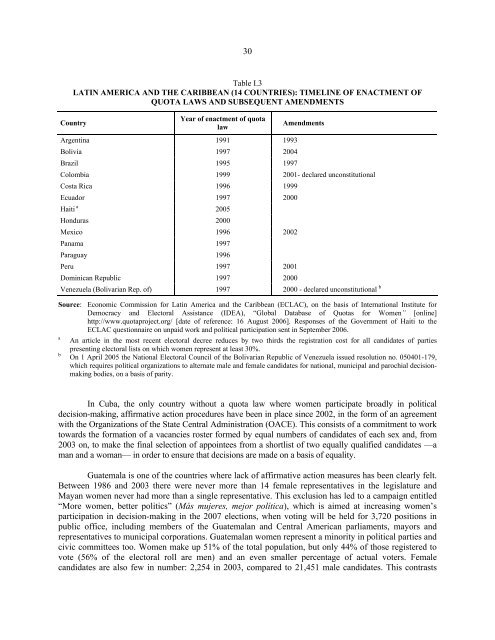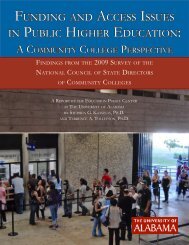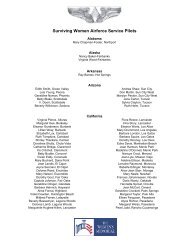Women in Latin America and the Caribbean - Cepal
Women in Latin America and the Caribbean - Cepal
Women in Latin America and the Caribbean - Cepal
You also want an ePaper? Increase the reach of your titles
YUMPU automatically turns print PDFs into web optimized ePapers that Google loves.
30<br />
Table I.3<br />
LATIN AMERICA AND THE CARIBBEAN (14 COUNTRIES): TIMELINE OF ENACTMENT OF<br />
QUOTA LAWS AND SUBSEQUENT AMENDMENTS<br />
Country<br />
Year of enactment of quota<br />
law<br />
Argent<strong>in</strong>a 1991 1993<br />
Bolivia 1997 2004<br />
Brazil 1995 1997<br />
Amendments<br />
Colombia 1999 2001- declared unconstitutional<br />
Costa Rica 1996 1999<br />
Ecuador 1997 2000<br />
Haiti a 2005<br />
Honduras 2000<br />
Mexico 1996 2002<br />
Panama 1997<br />
Paraguay 1996<br />
Peru 1997 2001<br />
Dom<strong>in</strong>ican Republic 1997 2000<br />
Venezuela (Bolivarian Rep. of) 1997 2000 - declared unconstitutional b<br />
Source: Economic Commission for Lat<strong>in</strong> <strong>America</strong> <strong>and</strong> <strong>the</strong> <strong>Caribbean</strong> (ECLAC), on <strong>the</strong> basis of International Institute for<br />
Democracy <strong>and</strong> Electoral Assistance (IDEA), “Global Database of Quotas for <strong>Women</strong>” [onl<strong>in</strong>e]<br />
http://www.quotaproject.org/ [date of reference: 16 August 2006]. Responses of <strong>the</strong> Government of Haiti to <strong>the</strong><br />
ECLAC questionnaire on unpaid work <strong>and</strong> political participation sent <strong>in</strong> September 2006.<br />
a<br />
An article <strong>in</strong> <strong>the</strong> most recent electoral decree reduces by two thirds <strong>the</strong> registration cost for all c<strong>and</strong>idates of parties<br />
present<strong>in</strong>g electoral lists on which women represent at least 30%.<br />
b<br />
On 1 April 2005 <strong>the</strong> National Electoral Council of <strong>the</strong> Bolivarian Republic of Venezuela issued resolution no. 050401-179,<br />
which requires political organizations to alternate male <strong>and</strong> female c<strong>and</strong>idates for national, municipal <strong>and</strong> parochial decisionmak<strong>in</strong>g<br />
bodies, on a basis of parity.<br />
In Cuba, <strong>the</strong> only country without a quota law where women participate broadly <strong>in</strong> political<br />
decision-mak<strong>in</strong>g, affirmative action procedures have been <strong>in</strong> place s<strong>in</strong>ce 2002, <strong>in</strong> <strong>the</strong> form of an agreement<br />
with <strong>the</strong> Organizations of <strong>the</strong> State Central Adm<strong>in</strong>istration (OACE). This consists of a commitment to work<br />
towards <strong>the</strong> formation of a vacancies roster formed by equal numbers of c<strong>and</strong>idates of each sex <strong>and</strong>, from<br />
2003 on, to make <strong>the</strong> f<strong>in</strong>al selection of appo<strong>in</strong>tees from a shortlist of two equally qualified c<strong>and</strong>idates —a<br />
man <strong>and</strong> a woman— <strong>in</strong> order to ensure that decisions are made on a basis of equality.<br />
Guatemala is one of <strong>the</strong> countries where lack of affirmative action measures has been clearly felt.<br />
Between 1986 <strong>and</strong> 2003 <strong>the</strong>re were never more than 14 female representatives <strong>in</strong> <strong>the</strong> legislature <strong>and</strong><br />
Mayan women never had more than a s<strong>in</strong>gle representative. This exclusion has led to a campaign entitled<br />
“More women, better politics” (Más mujeres, mejor política), which is aimed at <strong>in</strong>creas<strong>in</strong>g women’s<br />
participation <strong>in</strong> decision-mak<strong>in</strong>g <strong>in</strong> <strong>the</strong> 2007 elections, when vot<strong>in</strong>g will be held for 3,720 positions <strong>in</strong><br />
public office, <strong>in</strong>clud<strong>in</strong>g members of <strong>the</strong> Guatemalan <strong>and</strong> Central <strong>America</strong>n parliaments, mayors <strong>and</strong><br />
representatives to municipal corporations. Guatemalan women represent a m<strong>in</strong>ority <strong>in</strong> political parties <strong>and</strong><br />
civic committees too. <strong>Women</strong> make up 51% of <strong>the</strong> total population, but only 44% of those registered to<br />
vote (56% of <strong>the</strong> electoral roll are men) <strong>and</strong> an even smaller percentage of actual voters. Female<br />
c<strong>and</strong>idates are also few <strong>in</strong> number: 2,254 <strong>in</strong> 2003, compared to 21,451 male c<strong>and</strong>idates. This contrasts











